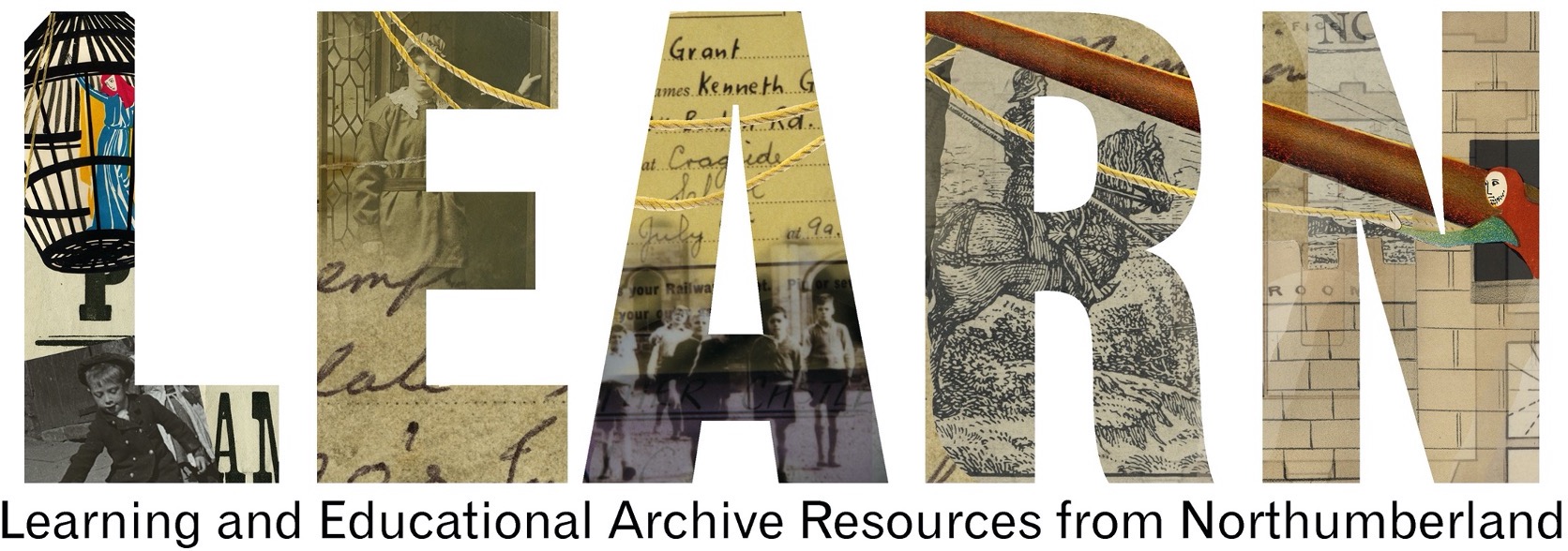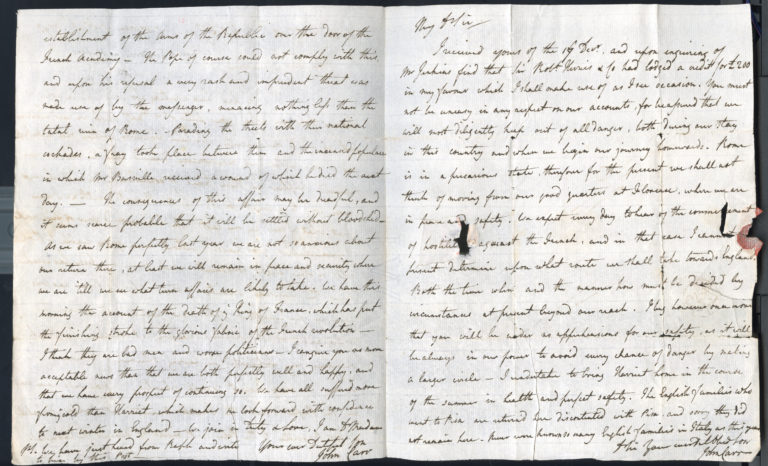Letters from John Carr to Isabella & Ralph Carr about the French Revolutionary Wars, 1793
Reference: ZCE F/1/1/1/130
Topics: French Revolutionary Wars, Military History
LETTERS FROM JOHN CARR TO ISABELLA & RALPH CARR
This single item is two letters written by John Carr, one to his mother Isabella Carr (nee Byne) and the other to his father, John Carr. The letters were sent from Florence, Italy, in February 1793.
John and Harriet had returned to Florence having delayed their journey home. Both letters were written on the same folded piece of writing paper. In the 18th century both paper and postage were expensive. John was writing to his parents in the most economical way. As was the convention of the time one side of the sheet of paper was left blank. The paper was then folded to form an envelope which was then sealed with wax. The address was then written on the exposed blank side.
The first letter is to Isabella Carr. John tells his mother that he and Harriet are writing to their parents fortnightly and that letters are occasionally delayed ‘as may frequently happen in these times of confusion’. This is a reference to the political situation in Europe and is evidence of the impact of this on the daily lives of citizens.
The French Revolutionary Wars (1792-1802), were a series of conflicts across Europe arising directly as a result of the French Revolution. European nations were shocked to learn of events in France and were fearful of the spread of revolution across the continent.
A series of conflicts were fought in northern Italy between the French Revolutionary forces and a coalition of Austria, Russia, Piedmont-Sardinia, and a number of other Italian states. Further detail about the political situation is provided when John describes to his mother the threatening behaviour of ‘Mr Basville’ [Nicolas Jean Hugon de Bassville, 1743-1793, agent of the French Minister at Naples] towards the Pope, and Basville’s later murder by the Roman mob. John declares that, after hearing of the execution of Louis XVI in Paris, France, he thinks the revolutionaries are ‘bad men and worse politicians’. He then assures his father he will take every care for the safety of his sister, Harriet Carr, and describes his dilemma in choosing when to safely start on their journey home. Such accounts must have been very alarming to Mr. and Mrs. Carr. The difficult political situation does not appear to have deterred the Grand Tourist. John writes to his father ‘Never were known so many English families in Italy as this year’.
The letter to John Carr includes reference to a letter of credit to the value of £200 being made via the London bank, Sir Robert Herries & Co. This is a payment by Ralph Carr to fund John and Harriet’s trip. £200 was a substantial sum – equivalent to in the region of £31,000 today.
ADDITIONAL RESOURCES
No 36 Jan[uar]y 12th) No 37 Florence Feb[ruar]y 3rd 1793
My Dear Madam
We had been waiting for some time in hopes of hearing from you when your Letter of 7th Jan[uar]y which we rec[eive]d yesterday put an end to our anxiety. We have regularly written once a fortnight and if our Letters are occasionally delayed upon the road, as may frequently happen in these times of confusion, you will always know how to account for it. As to Harriet’s health &c I may repeat what I said in my last. She has enjoyed four or five months of uninterrupted good health, without even being liable to those colds or other slight complaints which scarce any body has escaped during the unusual severity of this winter. Rome has long been in an unsettled state, and particularly so since the appearance of the French Squadron at Naples. We think ourselves very fortunate in having determined to remain where we are in every respect so well situated. You will have read in the Papers that the French Minister at Naples dispatch’d a Mr Basville to the Pope with orders to demand the immediate establishment of the Arms of the Republic over the door of the French Academy. The Pope of course could not comply with this, and upon his refusal a very rash and imprudent threat was made use of by the messenger, menacing nothing less that the total ruin of Rome. Parading the streets with their national cockades, a fray took place between them and the incensed populace in which Mr Basville received a wound of which he died the next day. The consequences of this affair may be dreadful, and it seems scarce probable that it will be settled without bloodshed. As we saw Rome perfectly last year, we are not so anxious about our return there, at least we will remain in peace and security where we are ’till we see what turn affairs are likely to take. We have this morning the account of the death of the King of France, which has put the finishing stroke to the glorious fabric of the French revolution. I think they are bad men and worse politicians. I can give you no more acceptable news than that we are both perfectly well and happy, and that we have every prospect of continuing so. We have all suffered more from the cold than Harriet, which makes me look forward with confidence to next winter in England. We join in Duty & Love, I am D[ea]r Madam Your ever Dutiful Son John Carr
P.S. We have just heard from Ralph and write to him by this Post
My D[ea]r Sir
I received yours of the 17th Dec[embe]r, and upon enquiring of Mr Jenkins find that Sir Rob[er]t Herries & Co had lodged a credit for £200 in my favour which I shall make use of as I see occasion. You must not be uneasy in any respect on our accounts, for be assured that we will most diligently keep out of all danger, both during our stay in this country and when we begin our journey homewards. Rome is in a precarious state, therefore for the present we shall not think of moving from our good quarters at Florence, where we are in p[eace] and safety. We expect every day to hear of the commencement of hostili[ties] against the French, and in that case I cannot [at] present determine upon what route we shall take towards England. Both the time when and the manner how must be decided by circumstances at present beyond our reach. I beg however once more that
you will be under no apprehensions for our safety, as it will be always in our power to avoid every chance of danger by making a larger circle. I undertake to bring Harriet home in the course of the summer in health and perfect safety. The English families who went to Pisa are return’d here discontented with Pisa, and sorry they did not remain here. Never were known so many English families in Italy as this year. D[ea]r Sir Your ever Dut[iful] Obed[ient] Son John Carr
Cockade – a knot of ribbons of distinctive colours worn to show the allegiance of the wearer to a particular political faction.
French Revolution and French Revolutionary Wars
The Ancien Regime and the Revolution by Alexis de Tocqueville (translated by Gerald Bevan, Penguin Classics, 2008)
Interpreting the French Revolution by François Furet (Cambridge University Press, 1981)
The Wars of the French Revolution: 1792-1801 by Charles J. Esdaile (Routledge (2018)
Citizens: A Chronicle of the French Revolution by Simon Schama (Penguin, 2004)
Twelve Who Ruled: The Year of Terror in the French Revolution by R.R. Palmer (Princeton University Press, 2005)
New Regime: Transformations of the French Civic Order, 1789-1820s by Isser Woolrich (W.W. Norton and Company, 1995)
The Oxford History of the French Revolution by William Doyle (Oxford University Press, 2018)
Louis XVI
The Life of Louis XVI by John Hardman (Yale University Press, 2016)
Louis XVI and the French Revolution by Ambrogio A. Caiani (Cambridge University Press, 2012)
Louis XVI: The Silent King by John Hardman (Hodder Education, 2000)
King’s Trial: Louis XVI Versus the French Revolution by David Peter Jordan, University of California Press, 1979)
Louis XVI and the French Revolution by Alison Johnson (McFarland & Co., 2013)



